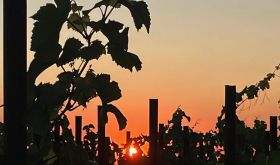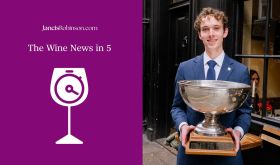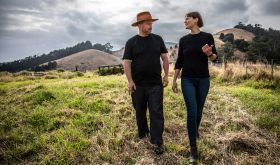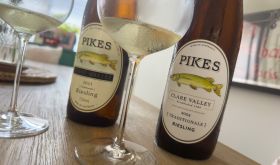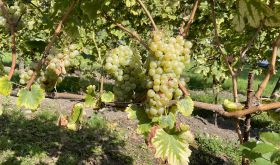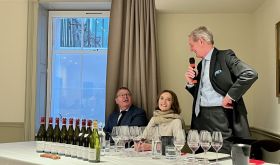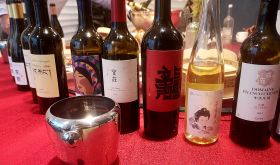Wandering with Michel and Marie-Pierre Troisgros round a vast building site on which they are constructing an ambitious new hotel-restaurant (see Troisgros – three-star rustication), I could not help considering the question of succession.
The Troisgros are galloping toward their sixties but show no let-up of energy. Encouraged by Michel’s father Pierre from whom Michel took over the kitchen of their world-famous three-star restaurant in the middle of Roanne, they expect to transfer to this new site in the village of Ouches in March 2017. Tenderly looking at the model of the future kitchens, Michel (seen above in the herb garden) swore that the only reason they were going to all this trouble was because of their personable 29-year-old son César, now firmly ensconced in the family kitchens, with his younger brother Léo looking likely to follow suit.

The following evening, I had exactly the same experience at the two-star restaurant in the Rhône valley chez Michel Chabran where Madame Chabran proudly introduced us to their son Louis, celebrating his 24th birthday that night by working at the stoves alongside his demanding father.
Earlier in the day I had visited Jean-Paul Jamet in the family cellars on the plateau above the vertiginous slopes of Côte-Rôtie. And who is this smiling young cellar-hand wearing a T-shirt from the Cape of Good Hope winery in South Africa? Why, young Loïc, vintage 1993, who, after a stint in the southern hemisphere, has decided to join the family business. So the Jamets are busy trying to acquire new parcels, including some in Condrieu to the immediate south for a change, so as to give Loïc a serious future and ensure the domaine can support another family member.
In theory, the question of succession in the food and drink business has never been easier; the subjects have never been more fashionable. A social status attaches to the métier of chef, restaurateur and wine producer the like of which has never before been seen. In the early 1970s when I graduated, I didn’t dare say I wanted a job in anything as frivolous as food or wine. Then it was much more likely that the most intelligent sons of a vigneron would seek a job in one of the professions rather than choosing to inherit the family domaine. As for daughters… This was a long time ago when only the likes of Lalou Bize-Leroy blazed a trail for female wine professionals.
But the tides of fashion change. Guillaume d’Angerville would be a good example. His father Jacques, Marquis d’Angerville and squire of Volnay, was insistent that Guillaume follow a career in finance so that he became literally a high transatlantic flyer for J P Morgan. But since his father’s death in 2003, Guillaume has been spending an increasing proportion of his time at the family’s domaine in Volnay, even adding to it with a new venture, Domaine du Pélican, in the fashionable Jura region.
One of the most fortunate French wine heirs must surely be Philippe, son of Marcel Guigal who is not only a gifted winemaker, but over his lifetime has built up his family’s firm in the northern Rhône to be the dominant independent force throughout the entire Rhône valley. (For example, in the autumn season, they receive an average of 80 samples of southern Rhône wines a day from hopeful vignerons.)
I remember when we were filming Marcel for our BBC2 series in the early 1990s, Philippe was far from the confident, mature businessman that he is today. His mother must have prayed hard every time he came home late – and the whole dynasty must have been absolutely thrilled when his wife produced twin boys five years ago. Now there’s a succession sorted!
But as was pointed out to me by a couple of independent vine growers further south, it is crucial that, within a family, the successors can amicably decide on who does what. The ideal will be that one of the Guigal grandsons will want to make the stuff and the other will want to sell it – should wine production be a sufficiently attractive proposition in 20 years’ time.
Sorting out harmony between individual family members can be a major job – as witness for instance the relatively recent division of the Louis Carillon estate in Puligny-Montrachet into a domaine each for the very different sons François and Jacques.
Then there is the Prince Charles scenario. With some notable exceptions, wine would seem to be an admirable preservative. Famous names such as Georges Duboeuf may still be working hard in his dominant position in Beaujolais at the age of 82, but he tastes every day – not with his son Frank but with the grandson of whom he is clearly so proud. Adrien is only 25, the son of Duboeuf’s daughter and Jean-Paul Lacombe of the famous restaurant Léon de Lyon, but I am reliably informed that he calls himself Adrien Duboeuf-Lacombe on his business card. ‘He knows wines better than me’, Georges told me proudly when we met in April 2015 at a celebration of Lalou’s 60th vintage.
All this succession business seems to work best in Europe, even in France where the taxman is ever-present, waiting to pounce on any transfer of ownership. The taxes are admittedly more punitive if a wine estate is sold to a third party, but taxes must still be paid if it passes into the hands of the next generation. There are all sorts of dodges whereby the business has one sort of status and the vineyards another; vinicultural tax advisors flourish. But the value of some of the finest properties in Bordeaux and Burgundy is so great that many families, particularly those with multiple shareholders, are tempted to cash in by selling to outsiders rather than paying the taxes involved in passing it on to the next generation.
Australians seem to be pretty good at wine-business succession, but is commonly said in the Napa Valley that you can count on the fingers of one hand the number of wine enterprises that have successfully been passed from one generation to another. As wineries mature, the proportion will surely increase, but there has certainly been some high-profile internecine strife in the Valley, and I know that, for example, Bill Harlan of Harlan Estate (and much more) has been giving considerable thought to the process of succession, looking to the wine dynasties of Europe for guidance.
I suspect working out how to pass on a multi-million dollar wine business is one problem we all think we could cope with.






